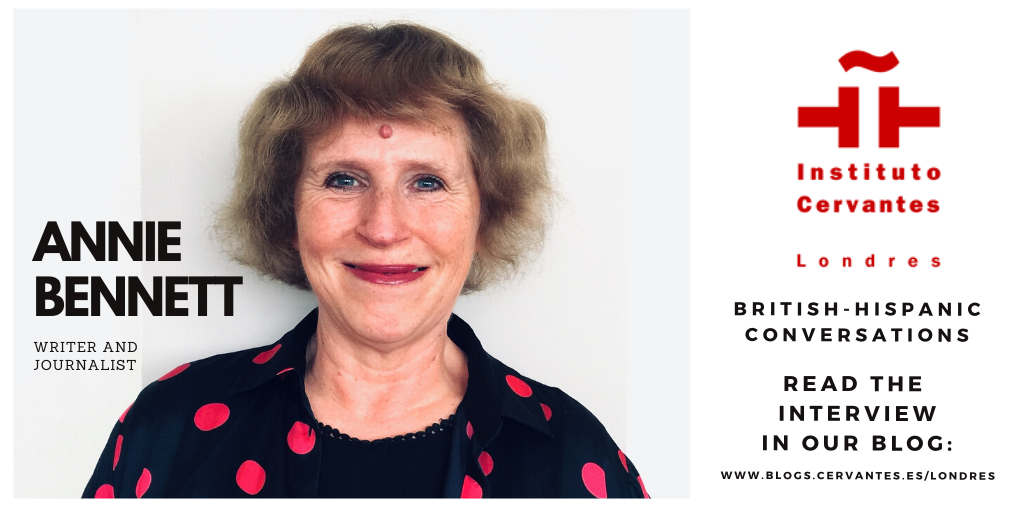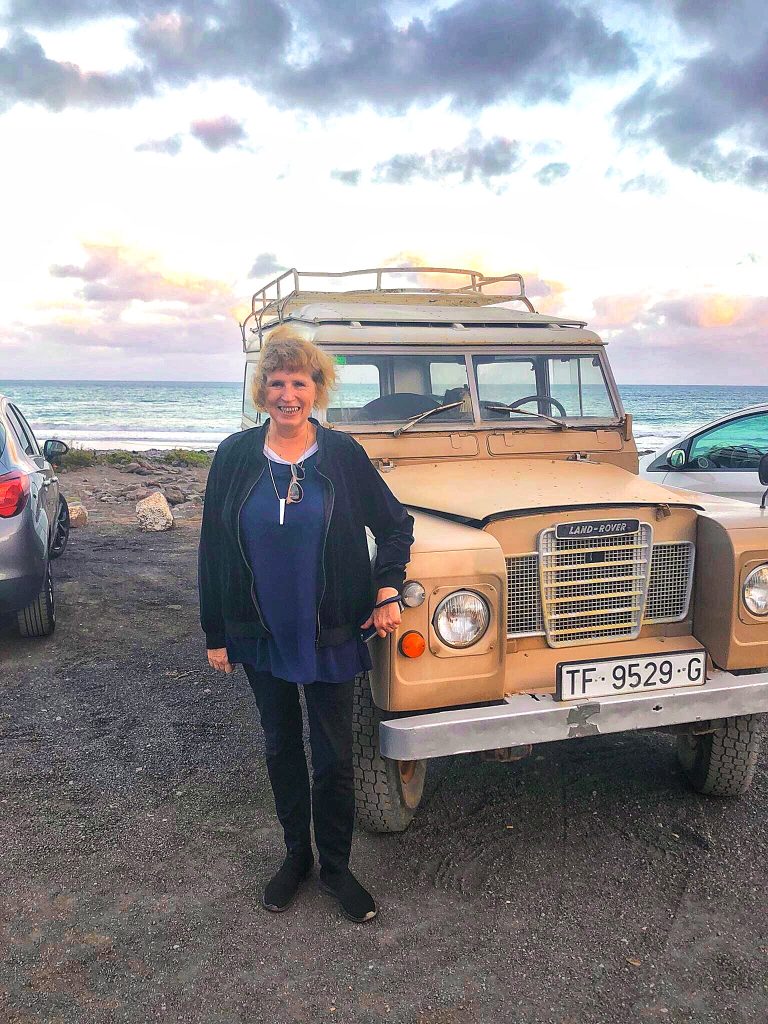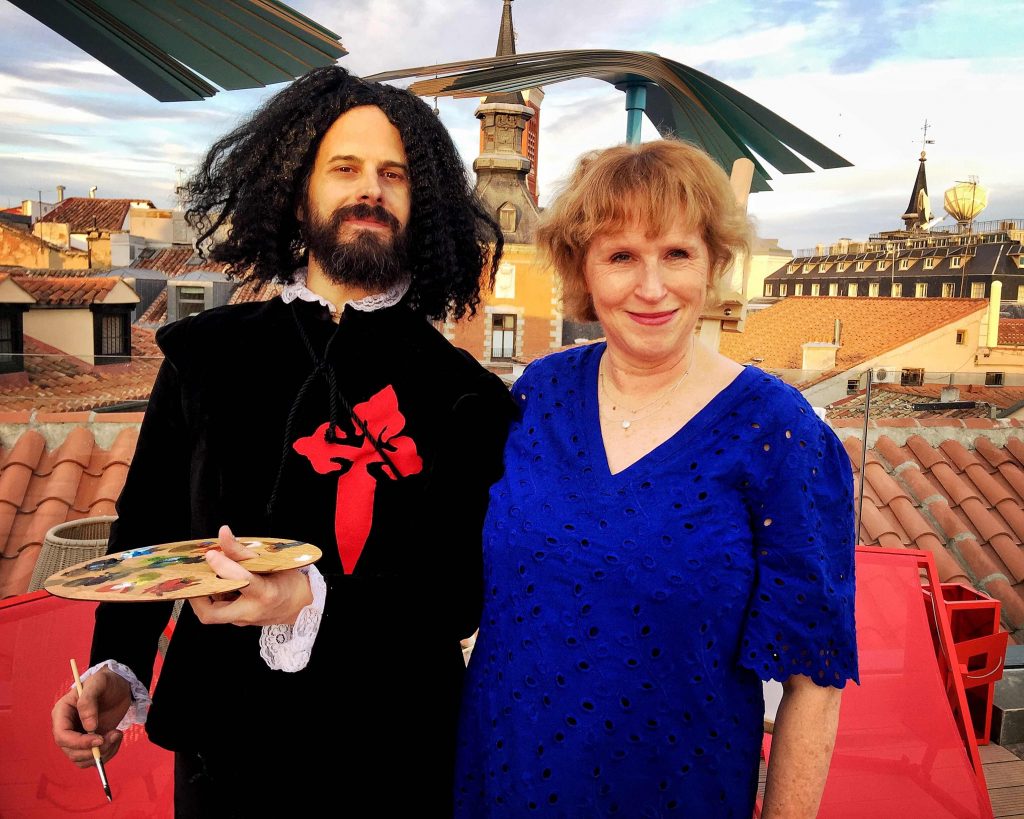«Spending so much of my life in Spain means I really appreciate the moment, just enjoying where I happen to be»

This week, we continue a series of interviews with personalities from the Spanish-British sphere. Our ninth guest, Annie Bennett, specialises in writing about Spain and is usually mooching around the country searching for the perfect tapas bar.
Bennett writes for The Daily and Sunday Telegraph and she is their Madrid expert. She has also contributed to The Guardian and Observer, The Times, The Financial Times, The Sunday Times Travel Magazine, The Independent and Independent on Sunday, Travel Weekly, Conde Nast Traveller, Tatler, Elle, Red, Time Out & various airline magazines.
Her latest book is Insight Explore Madrid (January 2018) and she has also written National Geographic Traveler Madrid, Blue Guide Madrid, Blue Guide Barcelona and Art Shop Eat Barcelona. She has won a few awards over the years, including Spain Travel Writer of the Year.
– You describe yourself as a food & travel writer mooching around Spain for Telegraph & other UK nationals. How did you get to this job? Why Spain?
I studied Spanish and German at the University of Westminster, specialising in translation and interpreting. As I had lived in Cologne for a couple of years before doing my degree, my German was much stronger than my Spanish, so after graduating I went to live in Madrid to try and improve it. This was the early 1980s and I was lucky enough to become friends with some of the key figures of the Movida, which opened the door to the dynamic creative scene. I became quite involved in the art world and started translating for galleries and museums. It wasn’t long before I started writing, just because I knew such interesting people really. I first interviewed Pedro Almodóvar back in 1985!
I moved back to London in 1992 for a few years, but my links with Spain became stronger than ever when I started travel writing. I wrote the Blue Guides to Madrid and Barcelona and started contributing to national newspapers and magazines. And I have just kept going with articles and books – my list of places in Spain I want to write about just gets longer and longer.

– You are based between Madrid and South Wales, is that the perfect combo?
My family is in South Wales and I do a lot of my writing here. I love the beaches of the Gower Peninsula, which are actually quite similar to those on the Rías Altas in Galicia. I’ve been here during lockdown and it is wonderful to be able to walk along the beach every day and explore Gower without tourists.
As I write about Spanish tourism for British people, it really helps to live a caballo between the two countries, to keep my finger on the pulse of what people are talking about and what they are familiar with in Spain, whether culture, gastronomy or tourism. I can’t assume that everyone knows who Velázquez or Rosalía are, for example. Now everyone buys chorizo in the supermarket and chucks it in everything (I’m not mentioning paella), but that certainly wasn’t the case 20 years ago. I’m currently reading María José Sevilla’s brilliant new book, Delicioso: The History of Food in Spain; we really needed a serious book in English about Spanish food and I’m really enjoying having the time to read it during lockdown.
– What places do you like visiting when you are in Spain? What topics do you like covering?
Madrid is home to me and I am champing at the bit to get back there. Something that has really surprised me during lockdown is how much I’m missing it and I have cried quite a few times watching videos and news reports of what is happening there.
But as 2020 is the centenary of the death of Benito Pérez Galdós, I am spending a lot of time in Madrid, albeit just in my head, by rereading Fortunata y Jacinta and his other wonderful novels. It is frustrating not to be able to take part in the walks and other events in the city organised to commemorate the anniversary, but as I know the streets and locations so well, it is almost like being there.
I love Valencia too and go a few times a year. I think it is a very underrated city, for culture and the urban beaches but more than anything the food. I could happily eat a rice dish for lunch every day. The produce there is so good and varied; I think it has one of the most dynamic gastronomic scenes in Spain, with fantastic chefs such as Ricard Camarena, Quique Dacosta and Bernd Knöller, to mention just a few. I’ve been going to Casa Montaña in the Cabanyal neighbourhood by the sea for more than two decades and it is my favourite tapas bar in Spain.
I find the area around Vejer de la Frontera on the Costa de la Luz quite intoxicating. The food scene is really interesting, there are fabulous beaches and I always seem to have a glass of sherry in my hand. One of the most exciting and memorable experiences I have ever had as a travel writer was being on one of the almadraba boats to witness the catch of bluefin tuna at close hand. I really enjoyed writing about this fascinating tradition – and eating just about every part of the tuna in the El Campero restaurant in Barbate.
I go the Hay Festival in Segovia every year, although I’m not sure if it is going to be possible this September. It is always one of the most enriching experiences of the year and listening to writers and artists talk about their work in convents, courtyards and gardens is just magical.
Lanzarote is a favourite too, although I hardly ever get to lie on a beach there. I have been writing about the ecotourism scene for the last decade or so and took part in the Saborea Lanzarote gastronomic festival last year. The cheeses and wines produced on the island are spectacular.

– How has the experience been? What do you enjoy the most about Spain?
Spending so much of my life in Spain means I really appreciate the moment, just enjoying where I happen to be. I love being in places some people consider unfashionable or not cool. I don’t care about that; in fact it’s a positive advantage to me. I’ve got a long list of towns in this category to visit or revisit when we can travel again. Getting a taste of how people just quietly go about leading very enjoyable lives without having to shout about it, in places that don’t get written about much, is one of the best things about Spain for me. I am always singing the praises of Soria and Jaén and have written several articles about the extraordinary cultural heritage of Alcalá de Henares.
– You visit places off the beaten track, could you tell us your favourite spots?
I’ve been a regular visitor to the Alpujarras for a long time, ever since I became fascinated by this magical mountain area after reading The Silence of the Sirens by Adelaida García Morales. She captured the hypnotic atmosphere of the astounding landscape so well. I was thrilled a few years ago to actually meet a curandera while walking down a track with a friend who lives there, as these local faith healers play an important part in the book.
Of course, the Alpujarras have become much more well known as so many people have read the wonderful books by Chris Stewart, since his best-selling Driving over Lemons was published two decades ago. Somewhere that still feels remote, however, is Babia, in the north-west of León. I had been reading about the area for years before I actually made it there, mostly in books and articles by Julio Llamazares and Luis Mateo Díez.
More recently, I was lucky enough to spend some time just over the border from Babia in the Somiedo area of Asturias, where brown bears prowl around the mountains. Getting up before dawn to go and spot them with local experts was a brilliant experience.

– You wrote an article with 20 reasons why British travellers will all return to Spain when this is finally over: boozy lunches, fast trains, slow trains, jamón, prawns, aperitivos, paradors, beaches… are you ready to go back?
While I am dying to return to Spain, I think I’m going to see how the situation develops as I am a bit wary about the potential health risks involved with being in airports and flying. I just want to be there without having to do the travelling really. I’m thinking it might be a good plan to enjoy the Gower beaches over the summer and start my Spain explorations again from September, although I’m not sure I’ll be able to wait that long.
– In Spain we have rural houses all around the country, have you ever stayed in one? Do you have any favourites?
As I review so many hotels, I don’t get to stay in as many rural places as I would like. I am however a big fan of rural tourism and have been writing about it for more than 20 years. There are so many extraordinary places to stay in the countryside and on lesser-known parts of the coast. I’ve stayed in some gorgeous houses and small rural hotels in Cabo de Gata in Andalucía, Cantabria, Asturias, Galicia and the Canary Islands. I stayed in an amazing house in Lanzarote that was actually a converted water cistern but looked like something from a James Bond film.

– Now it is easier to find Spanish ingredients and products in the UK. Which ones were always the hardest ones to find? Which ones are always in your larder?
I don’t actually buy that many Spanish products in the UK as I am usually – before the pandemic obviously – travelling backwards and forwards so frequently. Looking in my cupboards, I have pimentón, saffron, jars of good tuna and tins of sea urchin paté and anchovies. There is always a good supply of turrón and Paladín hot chocolate, which are my mother’s favourites. I always have quite a few olive oils from different parts of Spain as well as sherry vinegar. I seem to have got through most of my stock of Spanish wines and sherries though….
It is wonderful that now it is easy to get excellent olive oils, ham, cheeses, paella rice and wines from fantastic producers, delis and restaurants such as José Pizarro and Brindisa. Here in Wales we are lucky to have the Bar 44 and Ultracomida groups, who are absolutely passionate about Spanish produce and have been doing some great live tasting events during lockdown.


